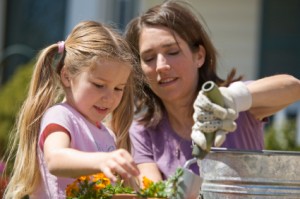Most everyone will agree that our school systems, in general, are not preparing our children for real life. While these schools may focus on education by teaching reading, writing, math, and other traditional subjects, they fail to prepare our children for life outside of the school walls. Which is why many parents, like myself, choose to homeschool.
 Think about your own school experience for a moment. When you graduated high school, did you know everything you needed in order to survive and succeed in life? If you were lucky, you knew how to read, write semi-decently, and had some basic history, science, and math skills.
Think about your own school experience for a moment. When you graduated high school, did you know everything you needed in order to survive and succeed in life? If you were lucky, you knew how to read, write semi-decently, and had some basic history, science, and math skills.
But were you prepared for life? Most likely you were not, if you were a product of a traditional school.
Homeschoolers can get a little obsessed at picking the “right” curriculum for every subject. I propose that homeschoolers relax and focus on the basic curriculum of life – those skills that every child should know before reaching adulthood. This isn’t a complete list, but it’s a good platform to jump from.
These skills should not be taught with lectures, notes, or textbooks. Instead, teach them by setting examples, through conversation, and in leading by example. Some skills will require much practice, while others will come naturally on the first or second try. Allow your child to make mistakes, for it is the way we learn.
Teach your child financial life skills.
Saving, budgeting, paying bills, investing, and frugality are just a few skills your kids need to know. More than anything else, they need to really understand the concept that you must spend less than you earn. Such a simple concept, yet very few adults can even master it. Teach your child from a young age to save money, put money in the bank, and have a savings goal.
Simple budgeting skills need to be taught at a young age as well. It works well with your math curriculum and allows your child to see why basic math is a necessary skill they’ll need for all their years. Allow your kids to see you budget and pay the bills. Don’t keep all the family finances a secret. Teach your children about online bill paying, writing checks, and by all means, make sure they know how to balance a bank statement!
Children should learn early on how to shop wisely. Don’t just let them buy on a whim; teach them to shop around to get the best deal, how to compare products, prices, and quality. Teach them to make their purchases last and not to waste what they’ve got. Teach them about credit, and by all means, please teach them about debt and responsibility.
When you teach your children about finances, it’s also a great time to teach them about giving and charity. This is one area where children will learn by seeing you lead by example. Be giving, and odds are, your children will learn how to be giving too.
 Teach your children how to talk, debate, and even how to argue well.
Teach your children how to talk, debate, and even how to argue well.
Kids should be given the opportunity to develop conversational skills. (This is completely the opposite of what’s taught in school – kids are always being told to be quiet!)
The best way to teach speaking skills is to frequently have good, rousing conversations! Around the dinner table is a great way to start teaching conversational skills and manners. You need to teach your children not only how to speak, but how to listen to someone, to understand what they’re saying, and to empathize. Teach your children how to dialogue with someone, not simply talk at them.
Conflict resolution is a good life skill that goes hand-in-hand with conversation. When people converse together, often they find themselves disagreeing. Teach your children how to properly deal with conflict. Teach them respect and listening skills, and they will be off to a great start. Learning to admit when you’re wrong and how to say I’m sorry is a skill many adults have yet to master – so the earlier you teach conflict resolution, the better! (Your child’s future spouse will thank you.)
Teach practical skills as you do them yourself.
Every young adult should know some basic car maintenance. You don’t have to teach your kids how to rebuild transmissions (unless that’s your thing). Instead, a few basics such as how to check fluids, the basics of how an engine works, how to change your oil, and what to do with a flat tire…these skills are good for boys and girls both to learn.
The same theory applies to skills around the house. Let your kids help you perform basic maintenance tasks at home. They should know how to do things such as how to change air filters, how to unclog a toilet, and how to do some basic painting, lawn maintenance, and simple home repairs. Teach them how to use various tools as well. They should also know when it’s time to call a professional, how to negotiate prices, and so on.
Too many adults grow up, leave home, and have no idea how to do laundry or how to clean a house properly. Teach your children from a very young age how to keep the house clean and uncluttered. Let them work right alongside you as you tackle daily, weekly, and monthly cleaning tasks. Odds are they’ll be less than enthusiastic about this “training,” but you’ll be glad you did it one fine day when they’re grown and can do their own laundry!
Home ec is what you make of it!
Many families, such as ours, practice some of the older domestic arts such as keeping a garden, canning and preserving food, making our own soaps and candles, and sewing. We try to be as self-reliant as possible and live as far off the grid as we can. If this is your lifestyle, I strongly encourage you to teach your children these skills as well.
My kids know how to do all sorts of “specialty” things like how to start a campfire, how to perform basic first aid in an emergency, and how to make an emergency shelter. My kids know how to haggle at the farmers market and how to milk a goat. Most people don’t have goats, and that’s okay. The principle here is to teach your children the skills that are important to your family life so that they can help and one day perform the tasks should they want to do so.
Some of our very best homeschool days have been spent canning in the kitchen or working in the garden. My kids have grown up this way…it’s just our way of life, and we love it.
©2011 Off the Grid News
 Off The Grid News Better Ideas For Off The Grid Living
Off The Grid News Better Ideas For Off The Grid Living



